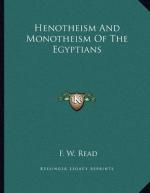|
This section contains 1,169 words (approx. 4 pages at 300 words per page) |

|
HENOTHEISM, a term coined from the Greek henos ("one") and theos ("god"), was for some time used by F. Max Müller interchangeably with kathenotheism, derived from the Greek kathʿhena ("one by one"). It was Friedrich Schelling (1775–1854) who first used the word henotheism in his study of mythology to indicate "relative, rudimentary monotheism," which he supposed was the idea of God in prehistoric consciousness (Philosophie der Mythologie und der Offenbarung, 1842). F. Max Müller (1823–1900), in his attempt at "tracing the origin and first growth of human thought," employed the word as a technical term of Religionswissenschaft to designate a peculiar form of polytheism that in his view was characteristic of the description of the gods in the Ṛgveda. He observed that in the Vedas—the oldest Indian religious literature—although deities are invoked by a variety of names, such as Agni ("fire"), Sūrya ("the sun"), U...
|
This section contains 1,169 words (approx. 4 pages at 300 words per page) |

|


